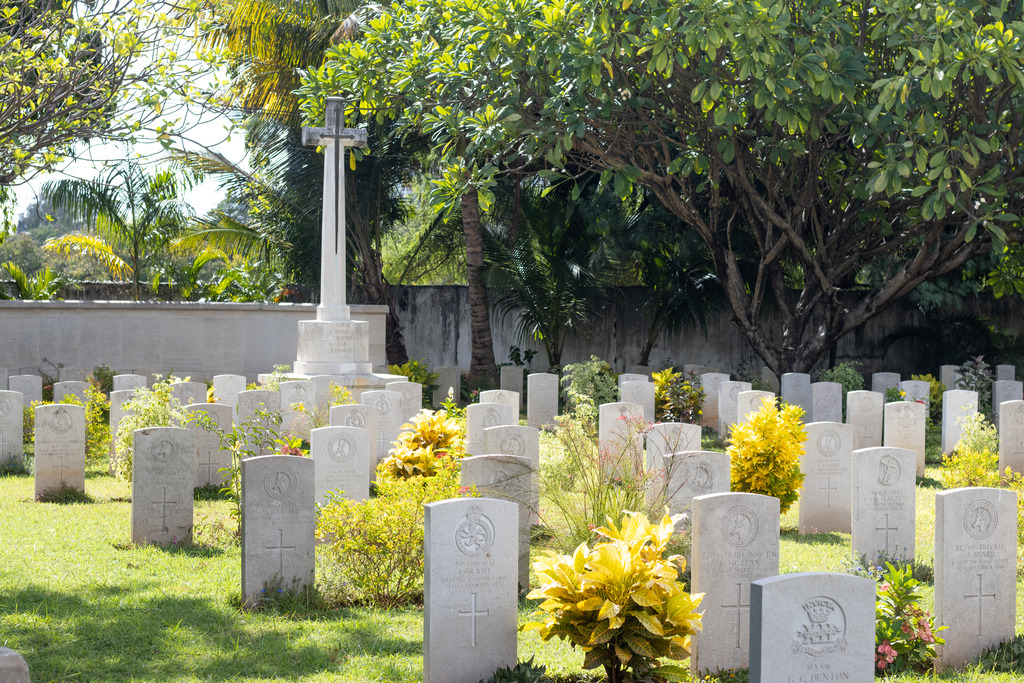Dar Es Salaam (Upanga Road) Cemetery
- Country Tanzania
- Total identified casualties 234 Find these casualties
- Identified casualties from First World War
- GPS Coordinates Latitude: -6.80751, Longitude: 39.28665
Please note
The Cemetery and parking are located on a busy main road. Access is via a concrete ramp over an open storm drain, in front of the Cemetery. Please take appropriate care when visiting.
Historical Note
 Within this cemetery stands the Pugu Road 1914–1918 Memorial dedicated to the 124 casualties originally buried or commemorated in Dar es Salaam (Pugu Road) Cemetery, which became unmaintainable in 1959 when the site was required for the construction of a new railway station. The original memorial inscription commemorated these casualties numerically, with the names listed in a printed memorial register. In 2003, a new memorial was erected with the names now inscribed on its panels.
Within this cemetery stands the Pugu Road 1914–1918 Memorial dedicated to the 124 casualties originally buried or commemorated in Dar es Salaam (Pugu Road) Cemetery, which became unmaintainable in 1959 when the site was required for the construction of a new railway station. The original memorial inscription commemorated these casualties numerically, with the names listed in a printed memorial register. In 2003, a new memorial was erected with the names now inscribed on its panels.
You can find more information about historical inequalities in commemoration in our Special Committee’s report.
Location information
The cemetery is on the right (eastern/coastal) side of Upanga Road (also known as Ali Hassan Mwinyi Road), approximately 1 kilometre to the north side of Dar es Salaam centre, close to the sea front (Upanga Road eventually becomes Bagamoyo Road).
The cemetery fronts directly onto the road, about 250 metres north-west of the Sheraton Hotel when coming from the centre of Dar-Es-Salaam.
Visiting information
ARRIVAL
The route to the cemetery from the city centre is signposted.
PARKING
Parking is available along a paved layby area at the side of the main road.
There are spaces for up to 5 vehicles.
The ground surface is flat and firm, constructed from block paving.
It is possible to park within 2 metres of the main entrance.
ACCESS, LAYOUT AND MAIN ENTRANCE
The cemetery is square shaped.
There is a low level (thigh high) metal gate, with a latched handle. Each section is approximately 1 metre wide and open inwards into the cemetery. There is a small step down from the paved entrance area into cemetery.
The Cross of Sacrifice is in a central position, towards the rear of the cemetery.
A large semi-circular memorial wall stands directly behind the Cross of Sacrifice, containing the Pugu Road 1914-1918 Memorial and Tanganyika Memorial. There is a small step up from the grass to paving in front of the memorial wall.
There are no seating areas in the cemetery.
The internal paths are grass; the ground is flat.
There is no Register Box in the cemetery.
ADDITIONAL INFORMATION
The cemetery is open Monday to Friday 0830 hrs to 1230 hrs and 1330 hrs to 1630 hrs.
Outside of these hours the cemetery is locked with a coded padlock. If you intend to visit this site outside the opening hours the code to the padlock can be obtained from our office in Kenya on 00 254 20260 4301.
History information
At the outbreak of the First World War Tanzania was the core of German East Africa. From the invasion of April 1915, Commonwealth forces fought a protracted and difficult campaign against a relatively small but highly skilled German force under the command of General von Lettow-Vorbeck. When the Germans finally surrendered on 23 November 1918, twelve days after the European armistice, their numbers had been reduced to 155 European and 1,168 African troops.
Dar es Salaam was the capital of German East Africa. On 8 August 1914, the first recorded British action of the war took place here, when HMS "Astraea" shelled the German wireless station and boarded and disabled two merchant ships - the "Konig" and the "Feldmarschall".
The Royal Navy systematically shelled the city from mid-August 1916, and at 8 am on 4 September the deputy burgomaster was received aboard H.M.S. "Echo" to accept the terms of surrender. Troops, headed by the 129th Baluchis, then entered the city.
On 12 September 1916, Divisional GHQ moved to Dar es Salaam, and later No.3 East African Stationary Hospital was stationed there. The town became the chief sea base for movement of supplies and for the evacuation of the sick and wounded.
DAR ES SALAAM (UPANGA ROAD) CEMETERY was opened as a war cemetery in March 1918 when the European section of Ocean Road Cemetery was closed. After the Armistice, Commonwealth and German graves were brought into this site from Kidete, Lansi and Utete Cemeteries.
The cemetery also contains the PUGU ROAD 1914-18 MEMORIAL to 124 casualties buried in Dar Es Salaam (Pugu Road) Christian Cemetery which could no longer be maintained to a satisfactory standard.
Towards the rear boundary of the cemetery is the TANGANYIKA MEMORIAL, which commemorates over 350 African troops who died in Tanganyika during the Second World War while serving in the East African Forces whose graves cannot be satisfactorily maintained or are unknown.
The cemetery was created as a civil colonial authority cemetery shortly before the first World War. The Commission carried out a major renovation of the site between 1959 and 1961 (designed by H.E. Jenner, ARIBA), during which the original Tanganyika and Pugu Road Memorials were added (a new screen wall feature was added behind the cross of sacrifice to replace these memorials in 2008). The cemetery now contains 231 Commonwealth burials of the First World War.


